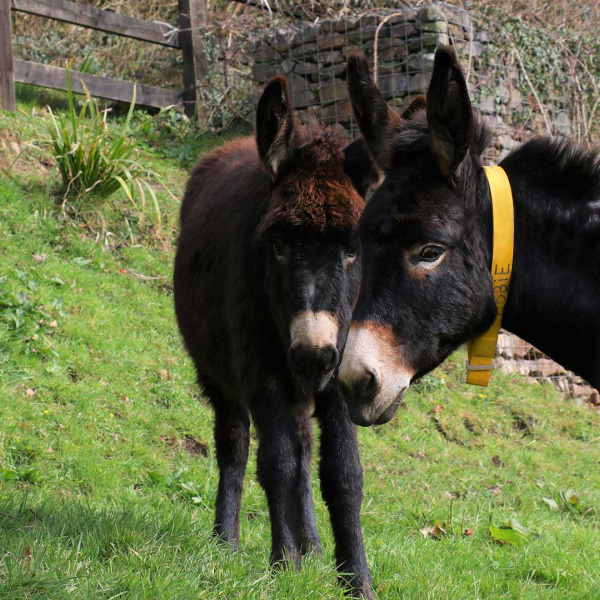A potential accident was averted after a pair of abandoned donkeys, running free near the busy A47 dual carriageway in Norfolk, were rescued by staff from international animal welfare charity The Donkey Sanctuary.
The mare and foal, named Abbie and Timmy, were spotted running in a field alongside the A47 in September 2020, with just a thin hedge separating them from the fast-moving traffic.
As the donkeys did not belong to the landowner, the field had not been made safe for them.
The donkeys could have easily found themselves in a very dangerous situation if they escaped onto the busy dual carriageway, as they posed a real risk to drivers.
Following a call from the landowner, a Donkey Welfare Adviser from the charity attended to help coordinate the rescue of the animals.
Sue Field, Donkey Welfare Adviser from The Donkey Sanctuary, said: “It was vital to move very quickly, both for the sake of the donkeys, and to reduce the potential of a major incident on what is a very busy road.
“It was very difficult to catch them in such a large open space. The donkeys were already naturally cautious, so had to be approached with a calm and relaxed mind-set.”
Abbie and Timmy were found in nearby woodland and eventually caught and safely loaded, before being transported to The Donkey Sanctuary’s local holding base.
The Donkey Welfare Adviser made enquiries to the RSPCA and local police to check if the donkeys had been reported missing, but none had been recorded.
As the donkeys were found on private land, the landowner was able to follow the process set out in the Control of Horses Act, to legally take possession of the donkeys in the absence of any contact from the owner.
The process requires land owners to serve notices where the donkeys were found and to report the actions to the police, after which time the landowner becomes their legal owner.
Sue Field continued: “The landowner was unable to keep the donkeys and it was agreed for them to come into our permanent care.
“What made this rescue particularly unusual was that both the donkeys were found in reasonable condition, and were generally healthy with no signs of illness. It remains a mystery as to why and how they ended up in this situation.”
On arrival at The Donkey Sanctuary’s international headquarters in Sidmouth, Devon it was discovered that Abbie was in the early stages of pregnancy.
Sara Blair Salter, New Arrivals Manager at The Donkey Sanctuary, said: “On arrival, we ensure all donkeys are checked over by our vets. This helps us to understand any individual care needs they may have, and includes checking if mares are in foal.
“We estimated that Abbie was approximately three months into her pregnancy.”
Since arriving at the sanctuary, Timmy has shown to be a very inquisitive foal and will approach grooms for their attention, whereas Abbie is more shy and nervous.
Sara added: “Abbie will approach us, but is quite nervous, which means we will have to do a lot of work with her ahead of her foaling.
“It is important that she is comfortable with us handling her new-born foal, which we expect to arrive in the autumn.”
The Donkey Sanctuary is a global leader for equine welfare, research and veterinary care. The charity operates programmes worldwide for animals working in agriculture, industry and transportation.
For interviews, images and information please contact The Donkey Sanctuary press office on 01395 573124 or 07870 849563 (including out of hours) or send an email.
The Donkey Sanctuary is the world's largest equine welfare charity. Our vision is a world where donkeys and mules live free from suffering and their contribution to humanity is fully valued. We run 10 sanctuaries around the UK and Europe, giving lifelong care to more than 7,000 donkeys and mules. Our hospital treats sick donkeys and trains vets both nationwide and worldwide. Our donkey-facilitated learning programme helps vulnerable children and adults develop life skills by connecting with donkeys on an emotional and physical level. The charity operates programmes worldwide for animals working in agriculture, industry and transportation, and those used in the production of meat and skin.
Please note that the name ‘The Donkey Sanctuary’ should not be abbreviated to ‘Donkey Sanctuary’, and the word ‘The’ should always appear with a capital ‘T’ as above.
